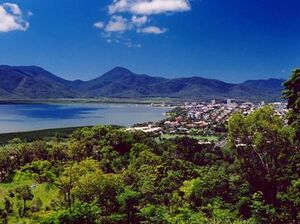
Mixed results on Council's eco-footprint
Friday 15 October 2010
Mixed results on Council's eco-footprint

Cairns Regional Council has issued its second annual State of the Environment report which measures their environmental performance in 2009-10.
Mayor Val Schier said although environmental reporting was not a legislative requirement in Queensland as it was in other States, Council considered it an important priority to demonstrate to the community its commitment to a sustainable future for the region.
“Council adopted strong policies earlier this year that guide our efforts to attain operational sustainability – the Corporate Sustainability Policy and the Carbon Emission Reduction Policy. We wanted to check how well we are implementing those strategies,” Cr Schier said.
Key areas that are measured include land management, energy, water and waste.
Here's how they performed on the previous year:
LAND MANAGEMENT
- number of trees planted by Council has decreased by 10%
- number of trees donated to the community has reduced by 51%
- number of feral animals and feral pigs destroyed has declined by 5%
ENERGY
- overall 20% increase in electricity consumption across Council, primarily driven by a 44% increase in electricity consumption by water and sewerage facilities
- 80% increase in effluent quality
- Council’s vehicles emitted a total of 4,070 tonnes of carbon dioxide equivalent, 16% less than 2008/09
- overall increase of greenhouse gas emissions of 5%
WATER
- Per capita residential daily water consumption increased by 2%
- 3% increase in total per capita water use (including industrial, commercial and agricultural use)
- amount of recycled water used increased by 60%
WASTE
- total domestic kerbside waste collected from Cairns residents increased by 1% to 49,412 tonnes
- total domestic kerbside recycling collected from Cairns residents increased by 2%
- 11,306 tonnes of recyclable materials were collected in total, and 53% of these materials were sent to Brisbane for recycling. The remaining 47% went to landfill.
Council has developed and introduced the Sustainability Scorecard, a tool for assessing and measuring the sustainability of projects, policies and operations with the aim of improving the organisation’s overall sustainability performance.
More than 250 staff members have been trained in the program which provides tools to aid employees in considering resource efficiency, biodiversity, community wellbeing and economic management.